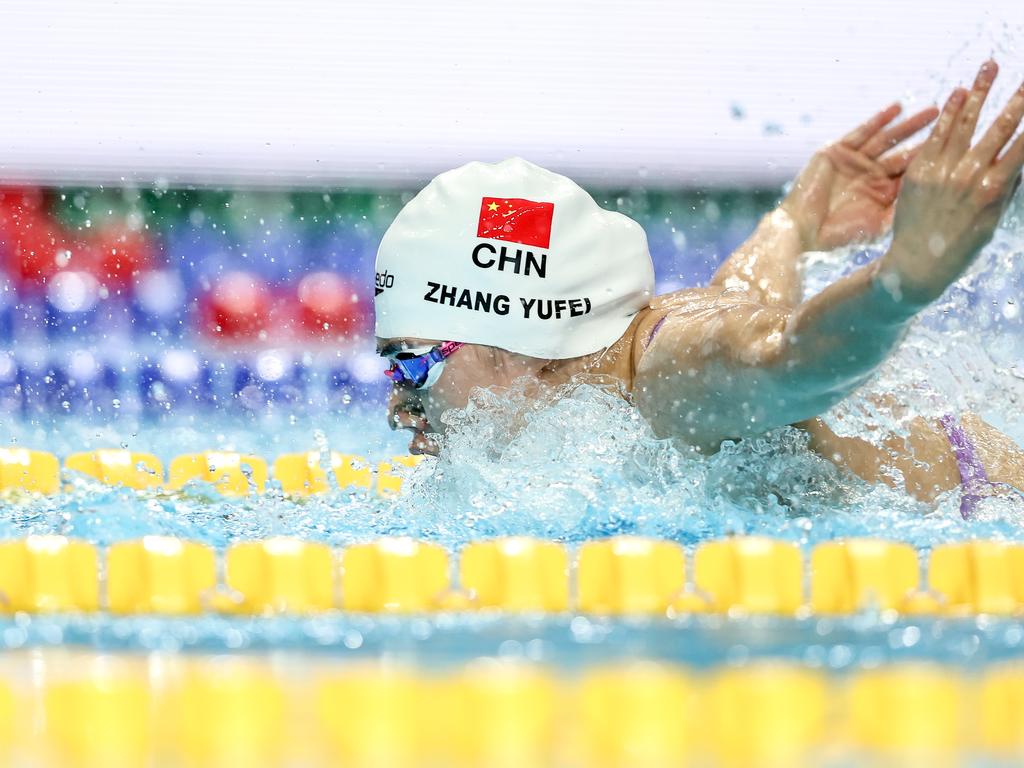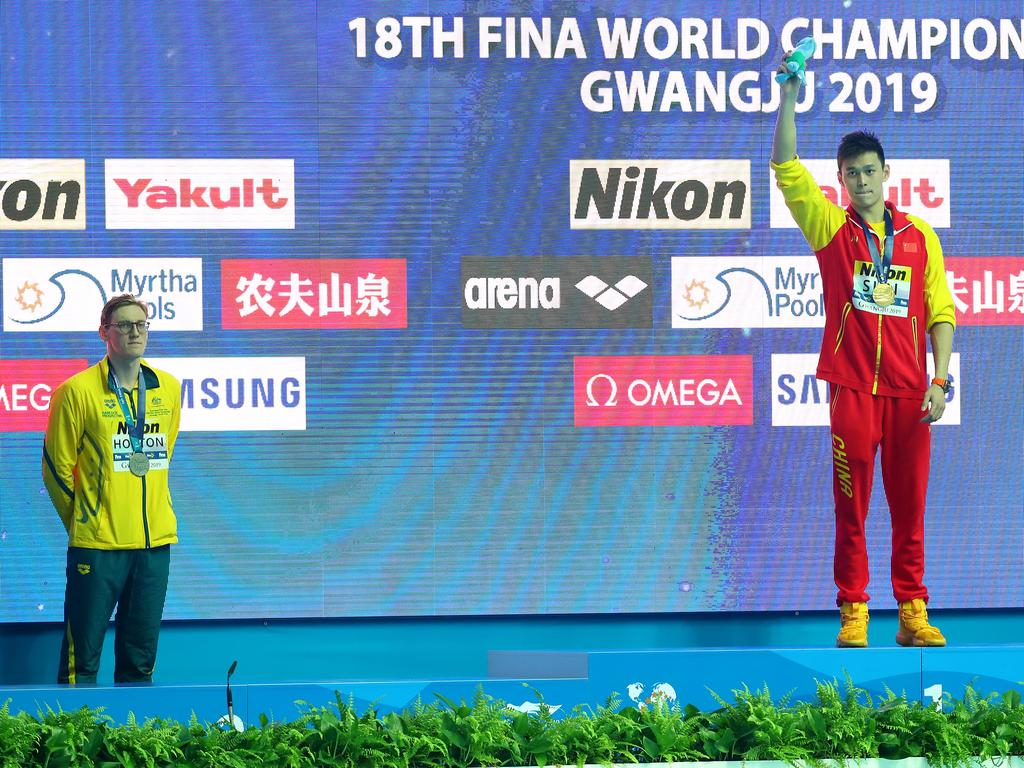Chinese swimmers allowed to compete at the Tokyo Olympic Games despite positive drug tests
The Chinese swim team at Tokyo Olympics, in 2021, had almost two dozen members who had tested positive to a banned substance ahead of the Games, but were allowed to compete due to contamination.
Almost two dozen Chinese Olympic swimmers were cleared to compete at the 2021 Tokyo Games despite testing positive to the same prohibited drug that Sun Yang was once banned for after it was determined they had all been innocent victims of a mass contamination.
The details have been kept under wraps for three years but News Corp can reveal that 23 members of the Chinese swimming team tested positive for trimetazidine at a training camp held just months before the start of the delayed Tokyo Olympics.
Normally, anyone who fails a drugs test receives some type of sanction under the sport’s strict liability policy, which states that athletes are responsible for any banned substance found in their body regardless of how it got there.
Chinese anti-doping authorities (CHINADA) deemed that the results were Adverse Analytical Findings (AAF) – but acquitted all the swimmers without imposing any penalties after finding the positive samples were the result of contamination.
The 30-member Chinese swim team then went on to win six medals in Tokyo, including three golds.
Zhang Yufei was the standout performer, winning two gold medals in one session, first taking out the women’s 200m butterfly title then returning to the pool to help China register a shock win in the women’s 4x200m freestyle relay, breaking Australia’s world record in the process.
This masthead is not suggesting Zhang is one of the 23 athletes that tested positive.

The World Anti-Doping Agency (WADA) and swimming’s world governing body FINA (now World Aquatics) were both notified about the adverse test results and looked into the case files.
They both agreed that the adverse results were caused by contamination so the 23 Chinese swimmers had not broken any rules and did not warrant any punishment.
But not everyone was so sure. Two other major players – the International Testing Agency (ITA) and the US Anti-Doping Agency – both expressed their concerns about the way the tests were reported and called for further investigations.
The ITA said it has since ramped up its testing of Chinese competitors, who were off limits to independent international testers in the lead up to the delayed Tokyo Olympics because of the Covid pandemic lockdown.
In a statement to News Corp, the ITA said: “The International Testing Agency (ITA) can confirm having received confidential and anonymous information in the summer of 2021 regarding a number of positive results affecting a group of Chinese swimmers following some testing activities performed by CHINADA in the first half of 2021.
“In parallel to a full assessment of the information received that remains active, the ITA conducted many targeted follow-up testing missions in 2021, 2022, 2023 and up until today. This is a standard procedure that the ITA puts in place whenever it receives confidential information which may impact the integrity of our partners’ sport competitions.”
World Aquatics – which was still known as FINA in 2021 – also confirmed that its Doping Control Board looked into the results but was satisfied everything was done by the book.
“Materials relating to the source of the AAFs were subject to independent expert scrutiny retained by FINA,” World Aquatics told News Corp.
“World Aquatics is confident that these AAFs were handled diligently and professionally, and in accordance with all applicable anti-doping regulations, including the World Anti-Doping Code.”
WADA’s Senior Director of Science and Medicine, Professor Olivier Rabin, said their own enquiries into the case supported the Chinese ruling that no violations occurred.
“The WADA Science Department reviewed this case thoroughly in June and July 2021. Indeed, we even sought pharmacokinetic and metabolism information from the manufacturer of TMZ in assessing the plausibility of the contamination scenario that was presented to WADA,” Rabin said in a statement to News Corp.
“Ultimately, we concluded that there was no concrete basis to challenge the asserted contamination. Indeed, the contamination scenario was further supported by the combination of the consistently low concentrations of TMZ as well as no doping pattern with several athletes presenting multiple samples collected over the course of several days which fluctuated between negative and positive (and vice versa).”

While it is not unusual for anti-doping authorities to hand down reduced sentences to athletes who test positive through no fault of their own, it is still rare that they get let off scot-free.
Free passes are even less common for trimetazidine, a drug that is used to treat angina and other minor heart conditions because it increases the blood flow to the main organs.
Also known as TMZ, trimetazidine is banned in sport because scientists believe it unfairly enhances athlete performances, especially in endurance events, so normally carries heavy penalties for anyone caught with it in their system.
One of the most high-profile recent cases involved the Russian teenage figure skater Kamila Valieva, who tested positive for trimetazidine two months before the 2022 Beijing Winter Olympics.
Russian officials did not immediately disclose the results so that she could compete in China but she was later given a four year ban and stripped of the gold medal she won in the team competition.
In 2018, US swimmer Madisyn Cox was given a reduced six-month ban after she tested positive to TMZ, despite the fact she was able to prove it was accidental by tracing the drug back to a batch of contaminated vitamins.
Even Sun Yang copped a three-month ban after testing positive to the same drug in 2014.

The Chinese Swimming Federation went easy on him because he told them he was suffering heart palpitations and was prescribed TMZ by a doctor who was unaware it was on the list of prohibited drugs.
The doctor was banned for a year but the Chinese took months before they confirmed the news of Sun’s suspension, which he quietly served in between competitions.
The delay triggered accusations of double standards, and lit the fire for Sun’s long public row with Australian middle distance swimming champion Mack Horton.
While Australia’s Shayna Jack missed the Tokyo Olympics after serving a two-year ban for testing positive to the anabolic agent ligandrol, other countries believe Chinese competitors are sometimes treated more leniently.
In 2018, Sun was initially cleared both by Chinese officials and FINA after he smashed his samples with a hammer before they could be tested for performance-enhancing drugs.
It was only after the details were publicly leaked that an appeal was launched that eventually led to him being found guilty of tampering and banned for four years.
The latest case has already raised fresh questions about the transparency of Chinese sports authorities with the Paris Olympics now less than 100 days away because of the country’s appalling history of cheating.
Chinese swimmers accounted for almost half of all the positive doping tests in world sport during the 1990s before a series of humiliating busts forced them to clean up their game.
The most infamous took place before the 1998 world championships in Perth when Chinese breaststroker Yuan Yuan and her coach were caught at Sydney Airport trying to smuggle human growth hormone into the country and four of her teammates later tested positive for steroids.

Both the ITA and USADA contacted WADA to express their concerns about the way the latest Chinese test results were reported.
The ITA reached out to WADA in 2022, asking whether the TMZ sample results had been misreported while in 2023, USADA emailed WADA calling for a fresh investigation to ensure there was no cover up.
But WADA’s Director of Intelligence and Investigations, Gunter Younger, said everything was above board and no further action would be taken.
“At every stage, WADA followed all due process and diligently investigated every lead and line of enquiry in this matter. The information provided to us by USADA and others was reviewed on each occasion in line with our normal procedure, and assessed according to the criteria stipulated within our Confidential Source Policy,” Younger said.
“The data held by us clearly showed that there had been no attempt to hide the positive tests as they had been reported in the usual way by the Chinese authorities.
Therefore, based on the available information and a lack of any credible evidence, the threshold to open an investigation was not met.”





